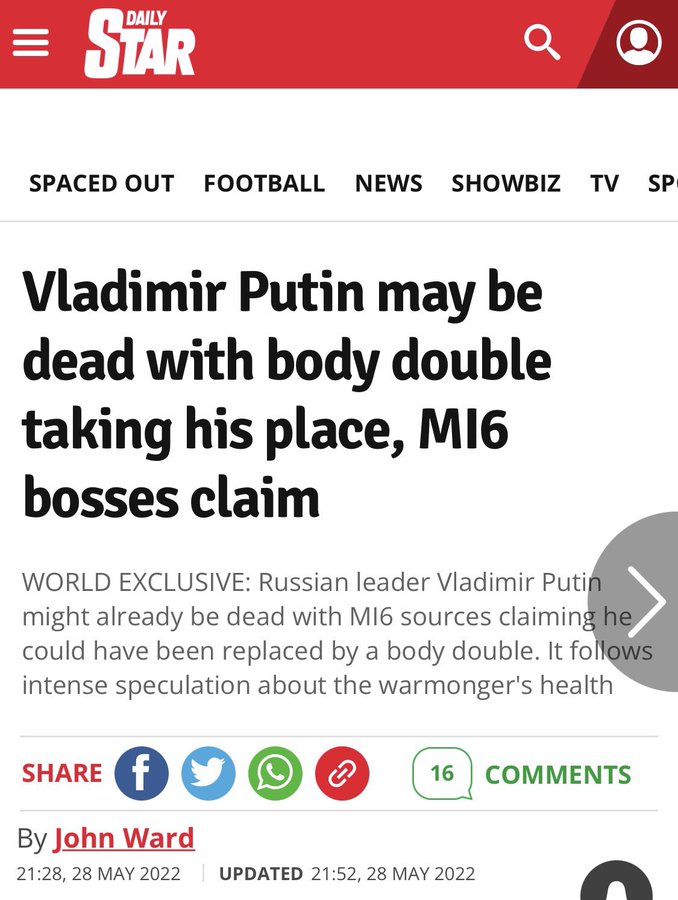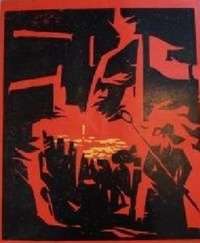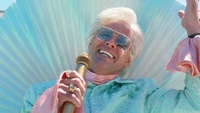Rusija i sve vezano za nju

- Posts : 5861
Join date : 2012-02-10
- Post n°251
 Re: Rusija i sve vezano za nju
Re: Rusija i sve vezano za nju
Ali nevezano za godine, da je isti bio kontekst, Putin bi ovo i mladji uradio

- Posts : 7784
Join date : 2017-03-14
- Post n°252
 Re: Rusija i sve vezano za nju
Re: Rusija i sve vezano za nju
ovo kao kad su nam Poljaci uvalili Tita



- Posts : 7330
Join date : 2019-11-04
- Post n°253
 Re: Rusija i sve vezano za nju
Re: Rusija i sve vezano za nju
Ambroz Vladimirovič Putin

- Posts : 672
Join date : 2016-04-16
- Post n°254
 Re: Rusija i sve vezano za nju
Re: Rusija i sve vezano za nju
Prikladnije je za neki topik Ukrajinski rat i ekonomija ali posto ne postoji evo ovde posto se najvise govorilo o Ruskoj ekonomiji. Zanemariti uobicajenu iritantnost tkzv Zeca

- Posts : 22555
Join date : 2014-12-01
- Post n°255
 Re: Rusija i sve vezano za nju
Re: Rusija i sve vezano za nju
Koliko je ovaj Zec iritantan. Najbolje je sto se orijentise po Brest-Litovskom sporazumu, verovatno je zacudjen i zasto Nemacka nije izdeljena na 4 okupacione zone.

- Posts : 10463
Join date : 2020-06-19
- Post n°256
 Re: Rusija i sve vezano za nju
Re: Rusija i sve vezano za nju
Marija Zaharova, portparolka Ministarstva vanjskih poslova Rusije komentarisala je nedavne izjave britanske šefice diplomatije Liz Truss, koje je Britanka dala tokom posjete Bosni i Hercegovini.
Ona u svom saopćenju tvrdi kako je Velika Britanija kroz historiju uvijek stvarala probleme na području Zapadnog Balkana.
U jednom dijelu svog saopćenja, Zaharova kaže da "ako je u historiji Balkana postojala sila razornija od baruta i granata, i smrtonosnija od kuge, onda je govorila na čistom engleskom".
Saopćenje Marije Zaharove prenosimo u cijelosti:
- Stručnjaci šapuću: tokom britansko-bosanskih pregovora dotaknuta je tema ulaska zemlje u "jedinstveni evropski dom" i integracije u NATO. Nekako je čudno govoriti o destruktivnom i neprincipijelnom uticaju NATO-a na Balkan, ali da podsjetim: 1999. godine Sjevernoatlantska alijansa je bombardovala Jugoslaviju koristeći osiromašeni uranijum.
Pametna Liz Trus zna za "mongolsko-tatarsku invaziju Ukrajine", ali zar ne zna za NATO bombardovanje Beograda? Tada će je zanimati i druge epizode "uticaja Zapada" na Balkan. Hoćemo li reći eruditu?
Mogli bismo krenuti od 13. stoljeća i prisjetiti se kako su zapadnoevropski vitezovi zauzeli i opljačkali Konstantinopolj i decenijama usporavali razvoj Vizantijskog carstva, uslijed čega je ono kasnije palo i prestalo postojati, ali ćemo se fokusirati samo na Britanci sami.
Dakle, tokom čitavog perioda zavisnog boravka Slavena na Balkanu, London je doprinosio njihovom podređenom položaju, na svaki mogući način potkopavajući potencijal narodnooslobodilačkih pokreta. Ne Britanija, nego Rusija pomogla je ostvarivanju nezavisnosti Grčke u 19. vijeku, a kada je to bilo od koristi za London, Engleska je direktno ušla u sukob protiv Rusije i njenih slovenskih saveznika na Balkanu, kao što je bio slučaj tokom Krimskog rata i takozvana "Istočna kriza" druge polovine 1870-ih.
Šef britanske diplomatije, lord Palmerston, otvoreno je priznao da je u interesu Londona da pokroviteljstvo neprijatelja Rusije i onih koji žele da oslobode slovenske narode na Balkanu. Bila je Britanija koja je 1876. odbila da podrži takozvani "Berlinski memorandum" Rusije i Evrope u vezi s ustankom balkanskih naroda (uključujući i Bosnu i Hercegovinu), čime je umanjio njegov značaj i težinu u međunarodnim poslovima.
Dugo se Balkan smatrao "buretom baruta Evrope", a zaoštravanje kontradikcija na jugoistoku Evrope podržavala je Britanija, jer je prvenstveno naštetila kako interesima austrijsko-njemačke koalicije tako i Rusiji u regionu. Konačno to je rezultiralo Prvim svjetskim ratom.
Već u dvadesetom vijeku, u prvom periodu Drugog svjetskog rata, Jugoslovenska vlada je molila Britance da pomognu Slovenima pred Trećim rajhom, da spase zemlju od okupacije i propasti, ali su Britanci ignorisali poziv rukovodstva južnoslovenske države.
Štaviše, oni su to zločinački iskoristili, vjerujući da će Berlin povlačenjem snaga Vejrmajta u Jugoslaviju olakšati Britaniji da vodi rat u Evropi. Kao rezultat toga, kao što dobro znamo, Jugoslavija je bačena na milost i nemilost njemačkim nacistima i italijanskim fašistima i uz pomoć Crvene armije oslobođena od strane partizana tokom najtežeg rata za nezavisnost.
U drugoj polovini 20. vijeka Britanija je uspostavila normalne odnose sa socijalističkom Jugoslavijom isključivo zbog neslaganja Beograda sa politikom Moskve, a čak i u ovim uslovima "prinudnog prijateljstva", kako pokazuju nedavno deklasifikovani bilješci Ministarstva vanjskih poslova, bila je zainteresovana za etničku nestabilnost u regionu, uključujući Kosovo.
Onda su počele 90-te, a sadržaj i značenje "britanskog (i NATO-a) utjecaja" na Balkan postali su očigledni cijelom svijetu. Kao dio zapadne koalicije, London je patronizirao trgovinu organima koju vode kosovski militanti i šverc svega u regionu, uključujući oružje.
Ako je u historiji Balkana postojala sila razornija od baruta i granata, i smrtonosnija od kuge, onda je govorila na čistom engleskom, navodi se u saopćenju.
_____
Međuopštinski pustolov.
Zli stolar.

- Posts : 52640
Join date : 2017-11-16
- Post n°257
 Re: Rusija i sve vezano za nju
Re: Rusija i sve vezano za nju
Mogli bismo krenuti od 13. stoljeća i prisjetiti se kako su zapadnoevropski vitezovi zauzeli i opljačkali Konstantinopolj i decenijama usporavali razvoj Vizantijskog carstva, uslijed čega je ono kasnije palo i prestalo postojati,
Da, to je bila tragedija, da toga nije bilo Nemanjici bi subereno vladali negde otprilike od Raške do Neretve


- Posts : 52640
Join date : 2017-11-16
- Post n°258
 Re: Rusija i sve vezano za nju
Re: Rusija i sve vezano za nju
Ne mogu, ovo je gomila poluistina

- Posts : 52640
Join date : 2017-11-16
- Post n°259
 Re: Rusija i sve vezano za nju
Re: Rusija i sve vezano za nju
Ali apsolutno nemaju nameru da nas ostave na.miru

- Posts : 19276
Join date : 2014-12-12
- Post n°260
 Re: Rusija i sve vezano za nju
Re: Rusija i sve vezano za nju
Prilično je bolestan čitav taj narativ.
To sve Kusturice i Bokani. A ne sumnjam da Antonić cokće dok peti put čita to.
To sve Kusturice i Bokani. A ne sumnjam da Antonić cokće dok peti put čita to.

- Posts : 52640
Join date : 2017-11-16
- Post n°261
 Re: Rusija i sve vezano za nju
Re: Rusija i sve vezano za nju
Ma nije bolestan nego netacan. Precutis sva svoja sranja, nafilujes tudja. I o cemu uopste prica glasnogovornik MFA Rusije ffs

- Posts : 82800
Join date : 2012-06-10
- Post n°262
 Re: Rusija i sve vezano za nju
Re: Rusija i sve vezano za nju
Ma brate, 13. vek u spoljnopolitickom saopstenju, poluistinitost je najmanji problem. Slazem se s beatakeshijem, ovo je pre svega ludilo.
_____
"Oni kroz mene gledaju u vas! Oni kroz njega gledaju u vas! Oni kroz vas gledaju u mene... i u sve nas."
Dragoslav Bokan, Novi putevi oftalmologije

- Posts : 35869
Join date : 2012-02-10
- Post n°264
 Re: Rusija i sve vezano za nju
Re: Rusija i sve vezano za nju
Cousin Billy wrote:Putin went full Radule
I to bas sad kad treba da popuni i potpise papir po kom cemo placati najmanje u Evropi
_____
★
Uprava napolje!

- Posts : 37709
Join date : 2014-10-27
- Post n°266
 Re: Rusija i sve vezano za nju
Re: Rusija i sve vezano za nju
koji bolesnici ali to je ta ideja paranoicnog potpunog istorijskog kontinuiteta gde se sve desava uvek i sada
_____
And Will's father stood up, stuffed his pipe with tobacco, rummaged his pockets for matches, brought out a battered harmonica, a penknife, a cigarette lighter that wouldn't work, and a memo pad he had always meant to write some great thoughts down on but never got around to, and lined up these weapons for a pygmy war that could be lost before it even started

- Posts : 7692
Join date : 2020-03-05
- Post n°268
 Re: Rusija i sve vezano za nju
Re: Rusija i sve vezano za nju
Interesantno…
Location of a Chechen barracks in the hotel belonging to the Directorate of the President so close to the Kremlin doesn't look like a random decision at all. It looks very deliberate. They're purposefully located so near, so that they would be always available pic.twitter.com/67Ce4d2UIs
— Kamil Galeev (@kamilkazani) May 30, 2022
_____
"Burundi je svakako sharmantno mesto cinika i knjiskih ljudi koji gledaju stvar sa svog olimpa od kartona."
“Here he was then, cruising the deserts of Mexico in my Ford Torino with my wife and my credit cards and his black-tongued dog. He had a chow dog that went everywhere with him, to the post office and ball games, and now that red beast was making free with his lion feet on my Torino seats.”

- Posts : 7330
Join date : 2019-11-04
- Post n°269
 Re: Rusija i sve vezano za nju
Re: Rusija i sve vezano za nju
doprinos ranijoj raspravi
Is Russia Fascist?
https://postsocialism.org/2022/05/24/is-russia-fascist/
The fact that I’m writing a blog post about this topic shows how detached from reality the commentary on Russia is. It’s understandable, I guess. But shoddy, media-ready ‘analysis’ from public intellectuals that does its best to ignore any sociological knowledge about the country is just really lame.
Tim Snyder’s NYT piece is a mishmash of historical analogism that focusses on Putin and sidesteps scholarship on Russian society. Snyder claims Russia (what, all Russians?) is fascist because it has a ‘leader cult’; celebrates a ‘cult of the dead’ via Victory Day; and is hostage to a myth of an imperial golden age. Very little of the essay, in fact almost nothing apart from a passing mention of Z people and rallies actually pertains to Russia beyond the Kremlin and some ideologists of questionable relevance (‘not Dugin again!’, said one of my undergraduate students).
All of these things are ‘true’, but they don’t really mean what Snyder says they mean.
At home, Putin has always been an ambivalent figure and never enjoyed unalloyed ‘enthusiasm’, even among his voting constituency. There’s loyalty and respect, even among the ‘morally opposed’. But that’s not a leader cult. The fact that so-called political technologists had to create so much PR for him, rather than let it naturally develop, proves the point. The guy never had an iota of charisma. He could never build a following like Trump.
A ‘cult of the dead’? There’s been a few pieces on this in the media. They tend towards a dangerous culturalism (the libel that Russians have a genetic ‘Asiatic’ predisposition to devalue human life and value violent domination). What Snyder ignores is the sociological research on the ‘Immortal Regiment’ marches, by scholars like Gabowitsch. Russians marching with placards of their ancestors who fought in the war is mainly not even a patriotic statement. It’s a rare permission to express personal loss, to experience connectedness, and to give voice to frustrated feelings of a need for communal activity.
The ‘Imperial Golden Age’? Well, this is true to an extent. I’ve written in this blog in the last 3 months that this does motivate some to support the war. But these people are a minority and in any case exist more visibly in societies like the US, France, and the UK. The irony here of Snyder’s comment is that it ignores the bigger golden age myth in Russia: the time people really pine for is the 1970s – the period of détente, peace, and the cementing of non-Russian elite power in the future independent republics of the USSR. Hardly imperial fare.
In reality, Snyder merely projects yet another US-centric take on what’s happening. This reflects liberal anxiety about Trumpism, real white supremacism in the US, and the militarization and securitization of US and Western societies.
Shall we actually look at some definitions of fascism?
I re-read Ian Kershaw recently and anyone who wants to understand pro-war sentiment in Russia should read his account of German society in WWII.
Kershaw’s is not the only definition, but it’s pretty simple. Fascism is based on hypernationalism that’s violently exclusionary and racial; It’s violent towards all political enemies; it’s macho, disciplined and militaristic. Optional features: social ‘renewal’ based on romantic utopian thinking; irredentism/imperialism; anticapitalism; corporatism (people know their place in society)
On Kershaw’s definitions we do find some fascistic elements to the Russian regime. But this comes up against the contradictions in ethnicizing Ukrainians. The whole point of Putin’s irredentism is that in his view Ukrainians aren’t really Ukrainians, they’re frustrated and misguided Russians (actually he probably doesn’t even believe this). Yes, they are ‘incorrect’ and errant Eastern Slavs, but the whole racialized perspective on Russian attitudes towards Ukrainians is, once again, a US-centric projection. The dehumanization of the ‘other’ is present among Russians and Ukrainians since the start of the war (but of course the anti-Ukrainian rhetoric in Russia was strong for a time now). But this is nothing to do with race or racism. Against Kershaw’s set of features, Russia is an insipid and equivocal ‘fascistic’ regime. Some of these features do not fit at all.
What about recent scholarship on ideology in Russia? Here we must turn, as Snyder fails to do, to Marlene Laruelle’s painstaking research. Her book is called Is Russia Fascist? Snyder commits perhaps the worst possible academic snub in ignoring it in his piece.
I know Laruelle’s work and I read her articles with my students every year. But don’t trust me, we can turn to the excellent reviews of the book. For example, this one by Roger Chapman. This is a positive, but critical review that unpicks Laruelle’s argument that Russia is a kind of illiberal state: rejecting global institutions, promoting economic protectionism and revaluing multiculturalism. Chapman questions why we need the term illiberal when in his view Laruelle could have just written ‘authoritarian/totalitarian’. The reason Laruelle does not use these terms is that in her view ideological diversity is still permissible and that coercion has some hard limits within Russia (so far).
Laruelle (in Chapman’s reading) makes use of a different historian’s definition of fascism – that of Roger Griffin. According to Griffin, fascism is a ‘revolutionary-utopian form of nationalism’. It requires an anti-modern myth of regeneration involving the violent destruction of enemies. Enemies are racialized through an ideological doctrine that catalyzes mass mobilization to ensure domination of those enemies both at home and abroad. So far, pretty similar to Kershaw. Laruelle notes that by these criteria, “not only is Putin neither Hitler nor Mussolini, he is not even Pinochet”.
In a late-2018 piece for PONARS, Laruelle picks apart similar arguements Snyder has made before. She says his approach is comparable to those of an observer who would extrapolate from Charlotteville riots to conclude that white supremacists had an iron grip on US society. “Simplistic reductionist techniques and invalid reasoning further confuse the analysis—and bias policy responses.”
….
In my view, the ‘Russia is fascist’ argument is so far from the reality of Russian society that it amounts to dangerous disinformation. What do actual political sociologists find?
Political and social demobilization at every turn – even incorporation through a ‘party of power’ does not serve ideological purposes or help mobilize. On the contrary, incorporation by the regime serves its stasis and the continuing enrichment and insulation of the elite. With some visible exceptions (who now get a lot of undeserved attention) the elite is uninterested in ideology and even governance (so an Eichmann could hardly be found). There isn’t a banality of evil. Just banality. In some senses the ‘mafia’ metaphor is better (though I criticise it here and reprise an analysis of corruption as a ‘thing’ that drives the regime here). ‘Ideology’ and ‘causes’ are dangerous to this regime.
In actual fact, most Russians’ lives are profoundly depoliticized to an unhealthy extent. Ironically, here is where Russia is open to a charge of fascism: the idea of fascism as a creeping erosion of citizenship and the achievement of the aims of totalitarianism by procedural means. The irony? The scholarship of this ‘post-fascist’ fascism is about our societies. About the UK, European states and the United States.
So, what is Russia as a political regime? Well, my recent take is here: an authoritarian neoliberal regime of some complexity. I argue that elements of this are present in our own societies and that many states are hurtling into the precipice Russia already occupies.
In Russia there are many forces of prefigurative politics, resistance and renewal, stacked against the seemingly dominant authoritarian power (the topic of my current book project!). Russian society has its share of neo-Nazi far-right forces which are both feared and leveraged by the elite. Other formations are far more visible and make Russia look more like….. Ukraine. There’s a liberal mainstream that dominates the ‘discourse’ beyond the state-controlled media and a strong communitarian strand of political thinking. Takes like ‘Russia is fascist’ ultimately show, once again, the unhealthy focus on the current elite, an elite that’s more and more disconnected from the majority. The invasion of Ukraine itself illustrates the intellectual, political, and institutional exhaustion of ‘Putinism’. But it proves little beyond that.

- Posts : 11765
Join date : 2014-10-27
Location : kraljevski vinogradi
- Post n°270
 Re: Rusija i sve vezano za nju
Re: Rusija i sve vezano za nju
It does not prove the point. Svaki kult ličnosti u modernoj istoriji je građen masivnom propagandom.But that’s not a leader cult. The fact that so-called political technologists had to create so much PR for him, rather than let it naturally develop, proves the point.
Ostali dijelovi kritike teza o ruskom fašizmu slično, niti jedna nije pobijena. Naravno da Rusija nije III Reich, radi se o tome koliko i kakvih fašističkih elemenata, ne o oživljavanju ideoloških, političkih i društvenih obrazaca od prije 100 godina. Termin fašizam koristimo uglavnom alarmistički, radi upozoravanja na neprihvatljive tendencije društvenog razvitka, ne da bismo Putina poistovjetili s Hitlerom.
O ovoj socijalnoj i političkoj demobilizaciji smo ovdje već pisali. Da, autoritarni neoliberalni režim, čiji neki aspekti dovode do nehumanih ishoda nalik onom što znamo iz istorijskog fašizma.
Ukratko, ukazivati na fišazam u smislu vrednovanja je ok, korištenje te kvalifikacije u analitičke svrhe ima vrlo ograničene domete.
_____
Ha rendelkezésre áll a szükséges pénz, a vége általában jó.

- Posts : 13817
Join date : 2016-02-01
- Post n°271
 Re: Rusija i sve vezano za nju
Re: Rusija i sve vezano za nju
Medvedev on sanctions against Russia:
“They hate us all! These decisions are based on hatred for Russia - for Russians, for all its inhabitants. Hate our culture. Hence the cancellation of Tolstoy, Chekhov, Tchaikovsky and Shostakovich. Hatred for our religion. Hence the desire to defeat the ROC.”
https://twitter.com/GazetaRu/status/1531563897945194497

- Posts : 3395
Join date : 2021-09-13
- Post n°272
 Re: Rusija i sve vezano za nju
Re: Rusija i sve vezano za nju
They hate our freedoms: our freedom of religion, our freedom of speech, our freedom to vote and assemble and disagree with each other.
_____
ja se rukovodim logikom gvozdenih determinizama

- Posts : 13817
Join date : 2016-02-01
- Post n°273
 Re: Rusija i sve vezano za nju
Re: Rusija i sve vezano za nju
Da, baš sam bio iskopao taj citat i razmišljao da li da okačim Dabju.

- Posts : 8095
Join date : 2020-09-07
- Post n°274
 Re: Rusija i sve vezano za nju
Re: Rusija i sve vezano za nju
Spektakularan niz
Very limited ambition and creativity with regards to Russia's future. Why do we need a Russia? What value did it ever add? Time to push for a final break up so Europe can finally become secure.
— Anders Östlund (@andersostlund) June 1, 2022
_____
Sweet and Tender Hooligan

- Posts : 52640
Join date : 2017-11-16
- Post n°275
 Re: Rusija i sve vezano za nju
Re: Rusija i sve vezano za nju
Imala je vrednost, Rusija je imala svoju "misiju" za Evropu. Ali
1) skupo ju je naplacivala
2) cini se da je od nje odustala posto joj nova ponudjena "cena" nije odgovarala.
1) skupo ju je naplacivala
2) cini se da je od nje odustala posto joj nova ponudjena "cena" nije odgovarala.



 by kapetanm Sun May 29, 2022 6:43 pm
by kapetanm Sun May 29, 2022 6:43 pm
 beatakeshi
beatakeshi